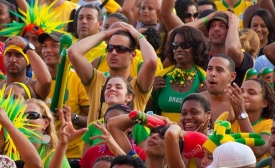nation branding
In Akihabara, Tokyo’s centre of anime and manga sales and fandom, a new government plan is wildly popular. The idea is to project an image of “Cool Japan” around the world (like Cool Britannia in the 1990s, but without the rhyme). Kyon, a costumed maid touting one of the area’s many maid cafes, says she feels fully part of the effort. Tsukamoto Hiroshi, a retail buyer of manga, says that the fragile Japanese comic industry could do with some official support. But isn’t a government-driven attempt to manufacture “cool”, well, just the opposite?

Noor Nirwandy and Ahmad Azran Awang's paper "Conceptualizing Public Diplomacy Social Convention Culinary: Engaging Gastro Diplomacy Warfare for Economic Branding" has recently been published in Procedia - Social and Behavioral Sciences. This paper discusses how a nation's food can be used to construct its global image and identity for economic benefits.
While the interest is only increasing among nations in applying branding practices in promoting tourism, investment and overall country perception, the academic treatment of the subject has been narrow and cursory. In my new book Shaping China’s Global Imagination: Branding Nations at the World Expo, I delineate the concept and practice of nation branding by comparing the various ways nations sought to engage the Chinese populace through the medium of pavilion space at the Shanghai World Expo.

Reflections on the conceptual implications of nation branding: how branding a nation develops its soft power advantage
While mega-events can involve colossal facilities of little use post-event, they can also provide reputational benefits and be seen as an investment in a nation's brand.

The World Cup might not be all hearts and roses for Brazil.
The World Cup was meant to be a celebration of a new Brazil -- powerful, prosperous and jubilant. When the ball starts rolling in three days the world may instead view images of violence and inefficiency. Seven years after gaining rights to host sport’s most-watched event, Brazil nears the tournament amid street protests, economic slowdown and a wave of strikes including subway and museum workers.
The website of the Bureau of International Expositions, a group that is sort of like the International Olympic Committee for these things, explains that today's expos – the term "fair" was retired in 1967 – have "become a unique platform for international dialogue, for public diplomacy and for international cooperation". Which is to say, really safe and boring.







